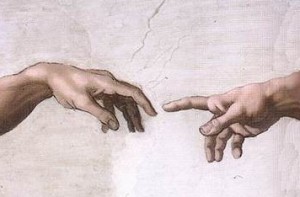The Risk of Creation
 “I cannot tell how you came into my womb: for I neither gave you breath nor life, neither was it I that formed the members of every one of you; but doubtless the Creator of the world, Who formed the generation of man, and found out the beginning of all things, will also of His own mercy give you breath and life again.” –II Maccabees 1:22-23
“I cannot tell how you came into my womb: for I neither gave you breath nor life, neither was it I that formed the members of every one of you; but doubtless the Creator of the world, Who formed the generation of man, and found out the beginning of all things, will also of His own mercy give you breath and life again.” –II Maccabees 1:22-23
Why did God conjure creation from the still, dark silence? Why does He even now, knowing the torments of this life, continue to draw men into the world, naked and helpless and rotten with sin?
Saint John of Damascus answers, “God was not content to contemplate Himself, but by a superabundance of goodness saw fit that there should be some things to benefit by and participate in His goodness.”
In simpler, less Platonic language, we can say that God creates because He loves–indeed, because He is Love. Love seeks to share itself. It is “diffusive of itself,” notes Saint Thomas Aquinas, again utilizing Platonic language borrowed from eastern Christian tradition, namely Saint Dionysius.
Our knowledge of the Trinity allows us to further plumb the depths of the matter. The Father not only creates all things through the Son; He creates all things for the Son: “For by Him were all things created, that are in heaven, and that are in earth, visible and invisible, whether they be thrones, or dominions, or principalities, or powers: all things were created by Him, and for Him” (Colossians 1:16).
We exist so that the Son may please the Father and the Father may glorify the Son. This is not a need that God must meet, but rather the joyous inclination of His perfect nature. The Trinity is a communion of Persons who love and enjoy one another and seek to manifest this infinite love and enjoyment on an infinite scale.
Saint Augustine, in the Confessions, thus refers to God as “the Sovereign Joy . . . sweeter than all pleasure.” He elucidates: “I call charity the motion of the soul toward the enjoyment of God for His own sake, and the enjoyment of one’s self and of one’s neighbor for the sake of God” (On Christian Doctrine). Existence is primarily an opportunity to savor God, not simply for what He gives, but for Who He is.
This is all well and good, technically speaking. But what about real life? The countless men and women who suffer unbearable pains of mind, body, and heart? The innumerable victims of famine and war, abuse and neglect, rape and murder, exploitation and disease? How does a good and loving God allow vast sections of His creation to wallow in such vile mire?
The frightening mystery of freedom is, at least superficially, a compelling point for atheism. Yet might we first ask ourselves the same question? For most of us are also “creators,” after the likeness of God. At some point, most of us will conceive and bring into the world offspring, hoping to share with them our love, despite the probability that they will within their lifetimes give and receive a fair share of wickedness. We take this gamble, the classic risk of creation, because we subtly recognize that love and life ultimately overwhelm evil and death.
It is worth meditating upon the fact that God created the world knowing full well that He would one day hang upon the cross. In a sense, God filled up the universe by His own self-emptying. He gave us life . . . by giving us His life. How wonderful is this Lord, “the Lamb slain from the foundation of the world” (Revelation 13:8)!
By the light of the Eternal Logos, let us perceive the enduring Christian paradox: there is death in life and life in death, always and everywhere.

